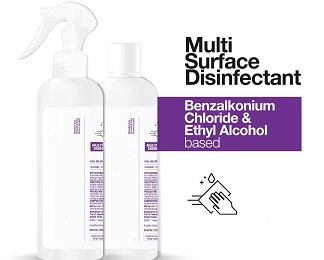Study Shows That Disinfectants Containing Benzalkonium Chloride Can Give Rise To Drug Resistant Microbes!
Disinfectants- Benzalkonium Chloride - Drug Resistant Microbes Jun 18, 2023 2 years, 6 months, 3 weeks, 5 days, 23 hours, 2 minutes ago
Disinfectants Used During COVID-19 Can Lead To Antimicrobial Tolerance & Antibiotic Cross-Resistance In Commensal And Opportunistic Bacterial Species
Disinfectants: In the battle against COVID-19, disinfectants have become our trusted allies in keeping our environments clean and germ-free. However, a recent study conducted by researchers at the University of North Texas at Dallas has shed light on a concerning issue. The study shows that
Disinfectants containing benzalkonium chloride (BAC) may be contributing to the emergence of drug-resistant microbes.

Benzalkonium chloride is a commonly used active ingredient in surface cleaning and disinfecting products. It is a mixture of alkyl benzyl dimethyl ammonium chloride compounds that has broad-spectrum antimicrobial properties. These compounds are effective in killing various microorganisms, including bacteria, yeast, and certain viruses.
However, the widespread use of BAC during the COVID-19 pandemic has raised concerns about its potential impact on microbial tolerance and antibiotic resistance.
To investigate this issue, the study team exposed several bacterial species, including Staphylococcus epidermidis, Corynebacterium xerosis, Staphylococcus aureus, Klebsiella pneumoniae, Escherichia coli, and Pseudomonas aeruginosa, to sublethal concentrations of BAC. They measured the minimum inhibitory concentrations (MICs) of the bacteria before and after repeated exposure to BAC. They also examined the bacteria's susceptibility to antibiotics.
The results were striking. Gram-negative bacteria, such as K. pneumoniae, E. coli, and P. aeruginosa, showed significantly higher MICs compared to Gram-positive bacteria. This suggests that opportunistic pathogens, which are commonly Gram-negative, are less sensitive to the inhibitory effects of BAC. Moreover, the bacteria that developed tolerance to BAC also exhibited cross-resistance to antibiotics. This implies that prolonged exposure to BAC may not only lead to the emergence of drug-resistant microbes but also make them more resistant to other antimicrobial agents.
The implications of these findings are concerning, considering the extensive use of BAC-containing products in various settings, including healthcare facilities, food industries, schools, workplaces, and homes.
The study team emphasizes the need to reevaluate the formulation and concentration of BAC-containing products to mitigate the development of antimicrobial tolerance and antibiotic resistance.
BAC compounds have long been considered effective and widely used in
disinfectants, antiseptics, sanitizers, and household cleaning products. Their stability, fast-acting nature, and prolonged biological activity on surfaces have made them popular choices. However, the precise composition of BAC mixtures in commercial products is often undisclosed, and the effects of these mixtures on microbial resistance have not been extensively studied.
The COVID-19 pandemic has further exacerbated the use of BAC-contai
ning products. Nearly half of the recommended
disinfectants listed by the Environmental Protection Agency (EPA) to combat SARS-CoV-2, the virus causing COVID-19, contain BAC as the active ingredient. This increased usage, combined with the stability of BAC compounds after application, means that bacteria are regularly exposed to sublethal concentrations of BAC. Over time, this exposure can lead to the selection of bacteria that are tolerant to BAC and resistant to antibiotics.
Antimicrobial resistance is a global public health threat, as identified by the World Health Organization (WHO) and the European Union (EU). BAC-containing
disinfectants have been identified as one of the leading causes of bacterial resistance to both disinfectants and antibiotics. Previous studies investigating bacterial adaptations to BAC have primarily used unspecified BAC compositions and concentrations, limiting their applicability to real-world scenarios.
The current study addresses this gap by examining the antimicrobial activities of purified BAC16 and a standard BAC mixture (BAC50) commonly found in commercial products. The study team conducted a series of experiments to assess the effects of these BAC formulations on bacterial tolerance and resistance.
The findings of the study revealed that both purified BAC16 and the standard BAC mixture led to increased tolerance in various bacterial species. The bacteria exposed to sublethal concentrations of BAC exhibited a higher minimum inhibitory concentration, indicating reduced susceptibility to the
disinfectant. This tolerance was particularly evident in Gram-negative bacteria, which are known to be more resistant to disinfectants compared to Gram-positive bacteria.
Furthermore, the researchers found that the development of BAC tolerance was accompanied by cross-resistance to antibiotics. The bacteria that became tolerant to BAC also showed reduced susceptibility to several antibiotics commonly used in clinical settings. This suggests that the use of BAC-containing
disinfectants could potentially contribute to the spread of antibiotic-resistant bacteria.
To understand the mechanisms behind these observations, the researchers investigated the genetic changes occurring in the bacteria during exposure to BAC. They identified specific genetic mutations and alterations in bacterial gene expression patterns associated with BAC tolerance. These genetic changes are likely responsible for the altered bacterial response to both BAC and antibiotics.
The study highlights the urgent need for reevaluating the use of BAC-containing
disinfectants and developing strategies to mitigate the emergence of microbial tolerance and antibiotic resistance. It suggests that a comprehensive approach is necessary, including the optimization of BAC formulations, the development of alternative
disinfectants with different modes of action, and the implementation of strict hygiene practices to reduce reliance on
disinfectants.
The study findings were published in the peer reviewed journal: Applied Microbiology.
https://www.mdpi.com/2673-8007/3/2/41
For the latest about
Disinfectants, keep on logging to Thailand Medical News.
Check Also:
https://www.thailandmedical.news/articles/covid-19-disinfectants
